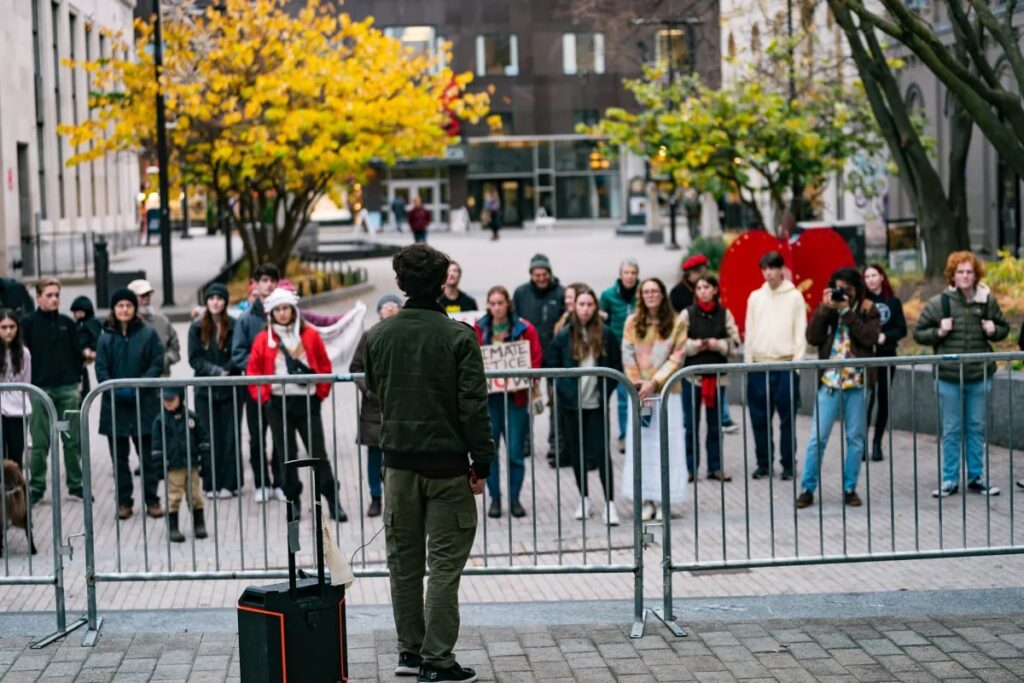
Sunrise Ithaca member and Cornell freshman Sam Poole addresses the crowd at a post-election climate rally downtown. Casey Martin/Ithaca Voice
On Friday November 15, dozens of community members gathered in the Bernie Milton Pavilion in downtown Ithaca for a climate justice rally organized by Sunrise Ithaca. Although mostly high schoolers and college students, the crowd encompassed a wide range of ages, including parents with young children, senior citizens, and office workers. Speakers alternated speeches on the election, local initiatives, and national climate policy with group chants emphasizing the importance of collective action: “When we fight-” they called. “We win!” the crowd responded.
Although Donald Trump’s reelection cast a shadow over the event, the event speakers also criticized Democrats for lack of action on climate change. Sam Poole, a member of Cornell Young Democratic Socialists of America and Sunrise Ithaca, addressed Vice President Kamala Harris’s support for oil drilling and fracking on the campaign trail: “Democrats weren’t acting very differently from Republicans on the environment.” Ace Dufresne ‘26, an IHS student and leader of Sunrise Ithaca, argued that the Democratic Party had relied on the votes of young people without advancing the policies meaningful to them.
Poole opened the rally by highlighting the impact that climate change has and will continue to have on local communities. Beginning by describing the recent park fires in New York City, Poole discussed the increased risks to Southside, a neighborhood housing the majority of Ithaca’s African American population, in the wake of the revised FEMA flood maps: “The fact is that, while climate change affects all of us, it doesn’t affect all of us equally. The most vulnerable communities, those with the least resources for resiliency, evacuation, or rebuilding, will always be hit the hardest.”
Jesse Bates, a seventh grader at Dewitt Middle School, had similar concerns about climate change’s burgeoning negative impact on the Ithaca community: “We’re swapping snowflakes for showers on Christmas Day.” Of course, temperature change is only the beginning if immediate systemic action does not slow the projected three degrees of warming. As Poole put it, “There is no alarm clock that rings to tell us our time is up, only an escalating series of natural disasters coming closer and closer until we are the ones we see on the news.”
Christina Tonitto, a Cornell researcher in environmental science, emphasized the importance of community action when comparing the fight for climate justice to the fall of the Berlin Wall in 1989: “It’s really important that all of the groups out here keep their many, many different actions going, because you can collectively create a better society.”
Dufresne closed his speech by speaking on Ithaca’s role specifically in shaping the precedent on climate legislation. The newly-passed Justice50 resolution, for instance, allocates half of city spending towards large infrastructure projects to support communities most vulnerable to climate change’s effects. Dufresne also discussed an upcoming campaign by Sunrise Ithaca to allow minors to volunteer on city commissions, such as the Sustainability and Climate Justice Commission. “I strongly believe that if any city in the US can demonstrate how to address the climate crisis promptly, equitably, and urgently, it would be us,” he said. “It will be hard to meet our goals, but I feel that we have a duty to show the rest of the country and the world that it is possible.”
